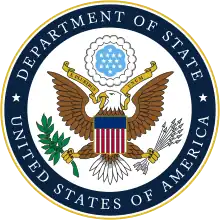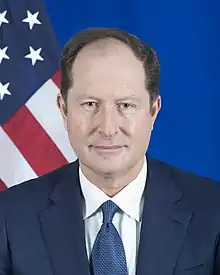| Ambassador of the United States to Poland | |
|---|---|
| Ambasador Stanów Zjednoczonych w Polsce | |
 Seal of the United States Department of State | |
| Nominator | The President of the United States |
| Appointer | The President with Senate advice and consent |
| Inaugural holder | Hugh S. Gibson as Envoy Extraordinary and Minister Plenipotentiary |
| Formation | April 16, 1919 |
| Website | U.S. Embassy - Warsaw |
The history of ambassadors of the United States to Poland began in 1919.
Until the end of World War I, Poland had been partitioned between Russia, Germany, and Austria-Hungary. After the war and the collapse of the empires, Poland became an independent republic in 1918.
The United States recognized the Second Polish Republic and established diplomatic relations. The first U.S. Minister to Poland was Hugh S. Gibson, appointed in 1919.
Diplomatic relations were maintained throughout the years of World War II with the government-in-exile of Poland resident in London.
The U.S. Embassy in Poland is located in Warsaw.
Ambassadors
|
U.S. diplomatic terms |
|---|
|
Career FSO After 1915, The United States Department of State began classifying ambassadors as career Foreign Service Officers (FSOs) for those who have served in the Foreign Service for a specified amount of time. Political appointee A person who is not a career foreign service officer, but is appointed by the president (often as a reward to political friends). Appointed The date that the ambassador took the oath of office; also known as "commissioning". It follows confirmation of a presidential appointment by the Senate, or a Congressional recess appointment by the president. In the case of a recess appointment, the ambassador requires subsequent confirmation by the Senate to remain in office. Presented credentials The date that the ambassador presented his letter of credence to the head of state or appropriate authority of the receiving nation. At this time the ambassador officially becomes the representative of his country. This would normally occur a short time after the ambassador's arrival on station. The host nation may reject the ambassador by not receiving the ambassador's letter, but this occurs only rarely. Terminated mission Usually the date that the ambassador left the country. In some cases a letter of recall is presented, ending the ambassador's commission, either as a means of diplomatic protest or because the diplomat is being reassigned elsewhere and replaced by another envoy. Chargé d'affaires The person in charge of the business of the embassy when there is no ambassador commissioned to the host country. Ad interim Latin phrase meaning "for the time being", "in the meantime". |
| Name | Title | Appointed | Presented credentials | Mission ended | Notes |
|---|---|---|---|---|---|
| Hugh S. Gibson[1] – Career FSO | Envoy Extraordinary and Minister Plenipotentiary | April 16, 1919 | May 2, 1919 | May 3, 1924 | |
| Alfred J. Pearson – Political appointee | April 2, 1924 | June 26, 1924 | August 18, 1925 | ||
| John B. Stetson Jr.[2] – Political appointee | July 3, 1925 | August 29, 1925 | August 29, 1929 | From 1930 onward, the U.S. envoy to Poland had the rank of ambassador. | |
| John N. Willys – Political appointee | Ambassador Extraordinary and Plenipotentiary | March 8, 1930 | May 24, 1930 | May 30, 1932[3] | |
| Ferdinand Lammot "Mot" Belin[4][5] – Career FSO | November 2, 1932[3] | December 13, 1932 | Recess appointment expired, March 4, 1933 | President Roosevelt nominated James Michael Curley for the post in 1933 but withdrew the nomination before the Senate acted upon it. | |
| John Cudahy – Political appointee | June 13, 1933 | September 6, 1933 | April 23, 1937 | ||
| Anthony Joseph Drexel Biddle Jr.[lower-alpha 1] – Political appointee | May 4, 1937 | June 2, 1937 | Left London December 1, 1943 | Biddle was the U.S. ambassador in Warsaw in September 1939 when Germany invaded Poland, which action set off World War II. The government of Poland evacuated the country, first to France (September 1939–June 1940) and later to England. Rudolf E. Schoenfeld opened the U.S. embassy near the government of Poland established in England, making his initial call as Chargé d'Affaires ad interim on September 21, 1940.[6] Biddle followed the government-in-exile to London, where he arrived on March 14, 1941, and continued as ambassador through 1943. | |
| The U.S. embassy in London to the government-in-exile of Poland was terminated on July 5, 1945. Rudolf E. Schoenfeld was still serving as Chargé d'Affaires ad interim when United States withdrew the recognition of the Polish government in exile, recognizing the new communist government, and the mission in London was closed. | |||||
| Arthur Bliss Lane – Career FSO | Ambassador Extraordinary and Plenipotentiary | September 21, 1944 | August 4, 1945 | February 24, 1947 | The U.S. Embassy in Warsaw was reestablished on July 5, 1945 |
| Stanton Griffis – Political appointee | May 15, 1947 | July 9, 1947 | April 21, 1948 | ||
| Waldemar J. Gallman[7] – Career FSO | July 7, 1948 | October 15, 1948 | July 8, 1950 | ||
| Joseph Flack – Career FSO | September 20, 1950 | November 30, 1950 | Left Poland, April 22, 1955 | ||
| Joseph E. Jacobs – Career FSO | April 1, 1955 | May 23, 1955 | July 23, 1957 | ||
| Jacob D. Beam – Career FSO | June 26, 1957 | August 9, 1957 | November 30, 1961 | ||
| John M. Cabot – Career FSO | January 30, 1962 | March 2, 1962 | September 24, 1965 | ||
| John A. Gronouski – Political appointee | September 11, 1965 | December 7, 1965 | May 26, 1968 | ||
| Walter J. Stoessel Jr. – Career FSO | July 24, 1968 | September 12, 1968 | August 5, 1972 | ||
| Richard T. Davies[8] – Career FSO | December 2, 1972 | January 5, 1973 | February 5, 1978 | ||
| William E. Schaufele Jr. – Career FSO | February 3, 1978 | March 30, 1978 | September 11, 1980 | ||
| Francis J. Meehan – Career FSO | October 2, 1980 | October 27, 1980 | February 11, 1983 | The following officers served as Chargé d'Affaires ad interim: Herbert E. Wilgis Jr. (February–July 1983); and John R. Davis Jr. (September 1983–January 1987). Davis was appointed as Chargé d'Affaires on January 9, 1987 and subsequently appointed as ambassador. | |
| John R. Davis Jr. – Career FSO | February 5, 1988 | March 17, 1988 | July 20, 1990 | ||
| Thomas W. Simons Jr. – Career FSO | August 6, 1990 | September 11, 1990 | April 28, 1993 | ||
| Nicholas Andrew Rey – Political appointee | November 22, 1993 | December 21, 1993 | October 25, 1997 | ||
| Daniel Fried – Career FSO | November 10, 1997 | November 27, 1997 | May 6, 2000 | ||
| Christopher R. Hill – Career FSO | May 31, 2000 | July 27, 2000 | April 14, 2004 | ||
| Victor Henderson Ashe – Political appointee | May 26, 2004 | August 17, 2004 | September 29, 2009 | ||
| Lee A. Feinstein – Political appointee | September 28, 2009 | October 20, 2009 | October 28, 2012[9] | ||
| Stephen Mull – Career FSO | October 24, 2012 | November 8, 2012 | August 29, 2015 | ||
| Paul W. Jones – Career FSO | June 8, 2015 | September 24, 2015 | July 28, 2018 | ||
| Georgette Mosbacher – Political appointee | February 14, 2018 | September 6, 2018 | January 20, 2021 | ||
| Mark Brzezinski – Political appointee | December 18, 2021 | February 22, 2022 | Incumbent | ||
See also
References
- ↑ Gibson was commissioned during a recess of the Senate but the commission not on record; he took oath of office on April 16, 1919. He was recommissioned on June 26, 1919, after confirmation.
- ↑ Stetson was commissioned during a recess of the Senate and recommissioned after confirmation on December 17, 1925.
- 1 2 "THE PRESIDENCY: Thanksgiving", Time, November 14, 1932, archived from the original on October 27, 2010, retrieved October 20, 2011
- ↑ Shapira, Ian (October 15, 2011), "A family's hidden history is revealed after sale of their grand Georgetown estate", Washington Post, archived from the original on October 16, 2011, retrieved October 20, 2011
- ↑ Belin was appointed during a recess of the Senate. He was not recommissioned and his recess appointment expired with the beginning of the next Senate.
- ↑ "Rudolf Schoenfeld, Ambassador To 3 Nations for U.S., Dies at 86". The New York Times. April 19, 1981. Retrieved February 4, 2020.
- ↑ Gallman was commissioned during a recess of the Senate and recommissioned after confirmation on March 2, 1949.
- ↑ Davies was commissioned during a recess of the Senate and recommissioned after confirmation on February 8, 1973.
- ↑
- //history.state.gov/departmenthistory/people/feinstein-lee-andrew
- ↑ Biddle was also commissioned to the governments-in-exile of Belgium, Czechoslovakia, Greece, Luxembourg, the Netherlands, Norway, and Yugoslavia.
External links
This article is issued from Wikipedia. The text is licensed under Creative Commons - Attribution - Sharealike. Additional terms may apply for the media files.
